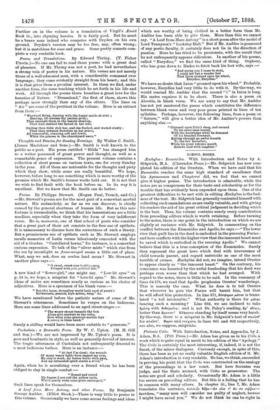Poems. By Philipps Stewart. (Kegan Paul, Trench, and Co.) —Mr.
Stewart's poems are for the most part of a somewhat morbid nature. His melancholy, as far as we can discover, is chiefly caused by the general shortness of human life. But as this mis- fortune is irremediable, we think that his lamentations are a little needless, especially when they take the form of very indifferent verse. He is, moreover, one of that school of poets who consider that a great part of their art consists in the free use of epithets. It is unnecessary to discuss here the correctness of such a theory. But a promiscuous use of epithets such as Mr. Stewart employs recalls memories of Latin verses laboriously concocted with the aid of a Gradus. "Castellated lawns," for instance, is a somewhat curious expression. To talk of the "silver mists" which rise from the sea by moonlight as flame-winged seems a little out of place. What, may we ask, does an urnless land mean ? Mr. Stewart in another place says :— " 0 sweet, sweet ever budding eyes.
Fringed with pale petalled lids."
A new kind of "flower-girl," one might say. "Low-lit eyes" on p. 54 is, we hope, a misprint for "love-lit eyes." Mr. Stewart's ideas of metre are sometimes nearly as curious as his choice of adjectives. Here is a specimen of his blank verse :—
"But this large, struggling world hath need of youth's Enthusiasm, passion, high action, deep," ac.
We have mentioned before the pathetic nature of some of Mr. Stewart's utterances. Sometimes he verges on the ludicrous. Here are some lines addressed to an aged street-singer :—
"The weary atones beneath thy feet Alone give answers to thy voice, Save when some generous maiden lays A penny in thine hand."






































 Previous page
Previous page